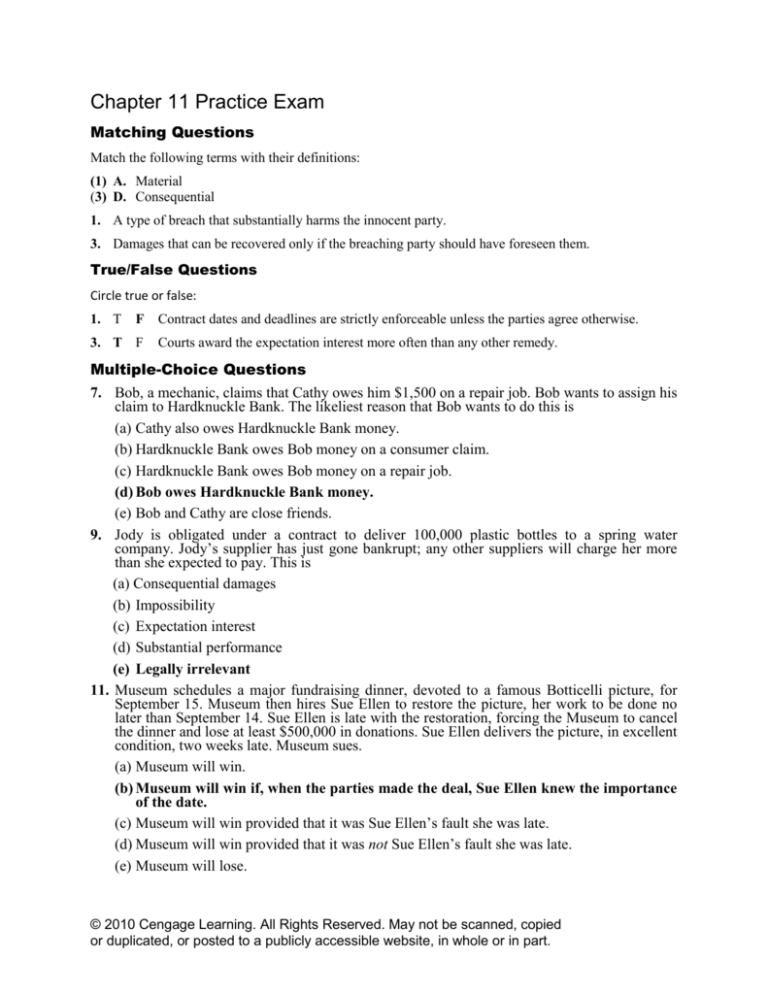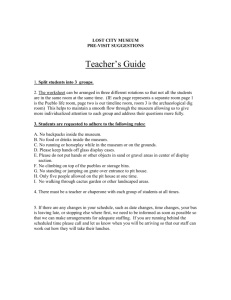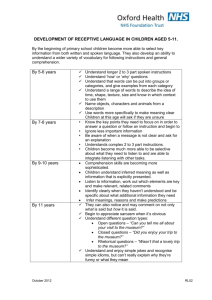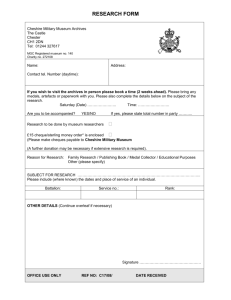
Chapter 11 Practice Exam
Matching Questions
Match the following terms with their definitions:
(1) A. Material
(3) D. Consequential
1. A type of breach that substantially harms the innocent party.
3. Damages that can be recovered only if the breaching party should have foreseen them.
True/False Questions
Circle true or false:
1. T
F
3. T F
Contract dates and deadlines are strictly enforceable unless the parties agree otherwise.
Courts award the expectation interest more often than any other remedy.
Multiple-Choice Questions
7. Bob, a mechanic, claims that Cathy owes him $1,500 on a repair job. Bob wants to assign his
claim to Hardknuckle Bank. The likeliest reason that Bob wants to do this is
(a) Cathy also owes Hardknuckle Bank money.
(b) Hardknuckle Bank owes Bob money on a consumer claim.
(c) Hardknuckle Bank owes Bob money on a repair job.
(d) Bob owes Hardknuckle Bank money.
(e) Bob and Cathy are close friends.
9. Jody is obligated under a contract to deliver 100,000 plastic bottles to a spring water
company. Jody’s supplier has just gone bankrupt; any other suppliers will charge her more
than she expected to pay. This is
(a) Consequential damages
(b) Impossibility
(c) Expectation interest
(d) Substantial performance
(e) Legally irrelevant
11. Museum schedules a major fundraising dinner, devoted to a famous Botticelli picture, for
September 15. Museum then hires Sue Ellen to restore the picture, her work to be done no
later than September 14. Sue Ellen is late with the restoration, forcing the Museum to cancel
the dinner and lose at least $500,000 in donations. Sue Ellen delivers the picture, in excellent
condition, two weeks late. Museum sues.
(a) Museum will win.
(b) Museum will win if, when the parties made the deal, Sue Ellen knew the importance
of the date.
(c) Museum will win provided that it was Sue Ellen’s fault she was late.
(d) Museum will win provided that it was not Sue Ellen’s fault she was late.
(e) Museum will lose.
© 2010 Cengage Learning. All Rights Reserved. May not be scanned, copied
or duplicated, or posted to a publicly accessible website, in whole or in part.
Short-Answer Questions
1. Nationwide Discount Furniture hired Rampart Security to install an alarm in its warehouse. A fire
would set off an alarm in Rampart’s office, and the security company was then supposed to notify
Nationwide immediately. A fire did break out, but Rampart allegedly failed to notify Nationwide,
causing the fire to spread next door and damage a building owned by Gasket Materials Corp. Gasket
sued Rampart for breach of contract, and Rampart moved for summary judgment. Comment.
Answer: Rampart’s motion was allowed. Gasket was merely an incidental beneficiary of the Rampart-Nationwide contract. Neither party intended to benefit Gasket, and Gasket thus had no right to
enforce the contract. Orion Group v. Nationwide Discount Sleep Center, 1990 U.S. Dist. LEXIS
10197 (E.D. Pa. 1990).
3. Racicky was in the process of buying 320 acres of ranch land. While that sale was being negotiated,
Racicky signed a contract to sell the land to Simon. Simon paid $144,000, the full price of the land.
But Racicky then went bankrupt, before he could complete the purchase of the land, let alone its sale.
Which of these remedies should Simon seek: expectation, restitution, or specific performance?
Answer: He should, and did, seek restitution. Expectation damages will be unavailable since Racicky
is bankrupt. Specific performance is impossible because Racicky does not own the land. Reformation
is irrelevant. Simon gets restitution, since he has conferred a benefit on Racicky and it would be
unjust for the defendant to keep it. Racicky v. Simon, 831 P.2d 241 (Wyo. 1992).
5. ROLE REVERSAL: Write a short-answer question that highlights the difference between an
assignment and a delegation.






